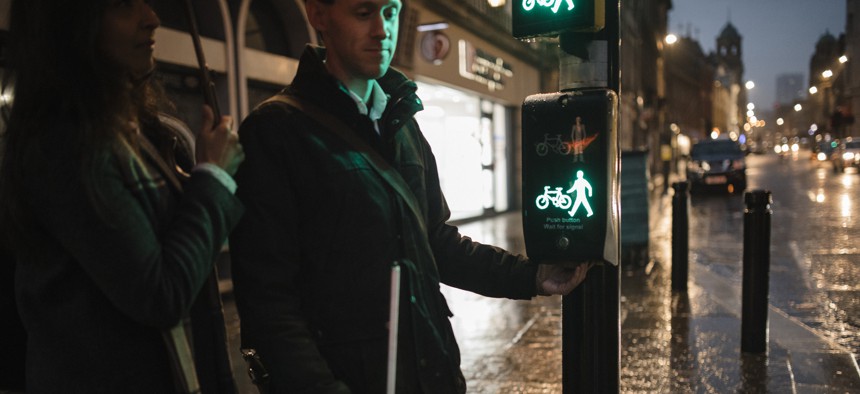Connecting state and local government leaders
A federal court directed New York City to improve the intersections in the next decade to bring them in line with the Americans with Disabilities Act.
New York City could soon start making crosswalks safer for people who are blind or have limited vision, after a federal court told the city to upgrade 9,000 crossings over the next decade.
The ruling came in response to a lawsuit brought by disability advocates, who said that 97% of the city’s intersections with visual “walk” and “don’t walk” signals did not have technology for blind or low-vision pedestrians, putting them at danger of being hit by vehicles when they cross the street. Nearly 200,000 people in New York are blind or have low vision.
U.S. District Judge Paul Engelmayer ruled that the lack of accommodations for people who cannot use the visual signals was a violation of the Americans with Disabilities Act and another federal law.
In late December, Engelmayer ordered New York to install accessible pedestrian signals at 9,000 intersections by the end of 2031. The signals use sounds and vibrations to indicate when it is safe to cross a street. By the end of 2036, according to the judge’s order, the city needs to include them at all 13,200 of its signalized intersections.
The trial judge acknowledged that the city had ramped up its efforts to install the APS devices, but said the pace was too slow.
The city’s “program, over its 20-year history, has installed APS at just one-twentieth of the city’s signalized intersections. Approximately half of those APS were installed after this lawsuit commenced [in 2018], after which the city ramped up its pace of APS installation,” he wrote.
Meanwhile, other cities around the country have rolled out more robust programs to install APS technology, the court noted.
Other Signal Upgrades
New York City has also made upgrades to its streetscape through its Vision Zero initiative that included changes to its signals that made navigating the city streets more dangerous for blind and low-vision pedestrians.
Most importantly, it adopted leading pedestrian intervals, which give people on foot a few extra seconds to start crossing a street before cars and trucks can start. That minimizes the chance that drivers will turn into pedestrians. But if the walk signals are only visual, blind and low-vision pedestrians still must rely on the sound of traffic moving to know when to cross, increasing the likelihood that they walk into the path of turning vehicles.
Putting APS devices at an intersection often involves erecting new poles close to crosswalks, installing new wiring and restoring the pavement and street markings. It usually takes around two months and costs an average of about $64,500 per intersection, according to testimony provided by the city.
It’s not clear whether the city will contest the order, as recently inaugurated Mayor Eric Adams establishes his administration’s priorities.
The city’s law department provided a brief statement but did not respond to specific questions. “The court acknowledged the operational challenges faced by the city in installing APS over the years,” a spokesperson said in the statement to Route Fifty. “We are carefully evaluating the court’s plan to further the city’s progress in increasing accessibility to people who are blind and visually impaired.”
But Torie Atkinson, an attorney who represented the plaintiffs in the case, noted that the city council had supported the wider deployment of APS throughout the city. The council asked former Mayor Bill de Blasio in 2019 to include $457 million to install APS at every signalized intersection, but de Blasio’s administration declined.
“The [city] Department of Transportation has expressed interest in making the city more accessible. They recognize that [APS] is a critical safety feature. And it is something that is really integral to the integration of people with disabilities into the city,” said Atkinson, a staff attorney for Disability Rights Advocates, a public interest law firm.
Plus, she noted, “they have a court order telling them to do it. If that doesn’t do it, I don’t know what will.”
Meanwhile, Christina Curry, one of the plaintiffs in the underlying lawsuit, said she is encouraged by the ruling.
“On a daily basis I have to deal with trying not to get hit by cars because there is no APS telling me when it is safe to cross,” Curry said in a statement. “Installing so many APS over the next 10 years means that I and tens of thousands of deafblind New Yorkers will have access to street crossing information and be able to travel safely, freely and independently throughout the city.”

NEXT STORY: Tech use in courts skyrockets, challenging those without internet access, study finds




